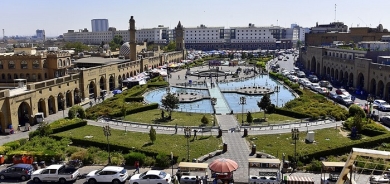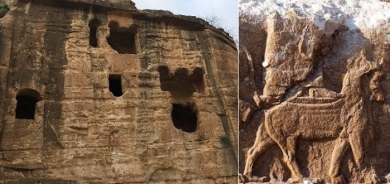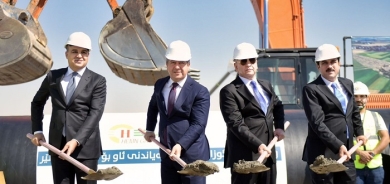Bombardment of Syria’s Homs resumes ahead of Lavrov’s visit as death toll mounts

The visit aims at pressing President Bashar al-Assad to end an 11-month uprising by implementing swift reform as Washington closed its Damascus embassy and Britain recalled its ambassador.
“The bombardment is again concentrating on Bab Amro. A doctor tried to get in there this morning but I heard he was wounded,” Mohammad al-Hassan, an activist in Homs, told Reuters by satellite phone.
“There is no electricity and all communications with the neighborhood has been cut,” he added.
Monday’s deaths included 19 children and 15 women. At least 61 people have been killed in Homs alone, as the neighborhoods of Bayyada, Ensha’at and Bab Amro are still bombarded by all kinds of rockets and mortar shells, Al Arabiya reported citing Syrian activists.
The violence on Monday came as world powers scrambled for a diplomatic strategy after the defeat of a U.N. Security Council resolution backing an Arab League call for Assad to give up power and start a political transition.
A member of the main opposition Syrian National Council said Assad’s forces killed scores of people people in a sustained bombardment of Homs, a center of armed opposition to his rule, two days after activists reported more than 200 people were killed in shelling.
Syrian authorities, who have denied firing on houses, said security forces killed “tens of terrorists” in Homs on Monday morning. An Interior Ministry statement said six members of the security forces were killed in the clashes, according to Reuters.
A resident of Homs told AFP the latest assault began shortly after 0400 GMT Monday, with unprecedented barrages of rockets, mortar rounds and artillery shells.
“What is happening is horrible, it’s beyond belief,” said activist Omar Shaker, reached by telephone as loud detonations were heard in the background.
“There is nowhere to take shelter, nowhere to hide,” he said. “We are running short of medical supplies and we are only able to provide basic treatment to the injured.”
One video posted on YouTube apparently showed a field hospital hit by shelling in the Baba Amro district and wounded patients lying on stretchers on the floor amid pools of blood and shattered glass.
Footage shot by a BBC undercover team in Homs showed buildings ablaze in rebel neighborhoods as they were pounded with heavy weapons.
Damascus blames “terrorist gangs”
Damascus blamed the bloodshed in Homs on “terrorist gangs” using mortars.
The State Department said it had closed the American embassy in Syria and withdrawn remaining staff after Damascus refused to address security concerns.
Senior State Department officials told CNN that two embassy employees left by air last week and 15 others, including Ambassador Robert Ford, left overland through Jordan on Monday morning.
The Polish government is to provide emergency consular services to any American citizens remaining in Syria.
Britain recalled its ambassador to Syria “for consultations,” Foreign Secretary William Hague told parliament, according to AFP.
“We will use our remaining channels to the Syrian regime to make clear our abhorrence at the violence that is utterly unacceptable to the civilized world,” Hague said.
Belgium also recalled its ambassador from Damascus.
U.S. President Barack Obama said that, however hard Western countries are prepared to lean on Assad diplomatically, they still had no intention of using force to topple him, as they did against Muammar Gaddafi in Libya last year.
“I think it is very important for us to try to resolve this without recourse to outside military intervention. And I think that's possible,” he told NBC’s Today show.
“There has been a great deal of collective action taken against the Syrian regime thus far,” White House spokesman Jay Carney told reporters. “There will be greater action taken, and we’re going to work with all the friends of Syria and the Syrian people to continue to pressure the Assad regime.”
Carney insisted that Assad was “running out of money” and said the United States would coordinate with allies to “make sure that he is unable to finance his continued crackdown.”
Western “hysteria”
Russia fought back against blistering criticism from the West for blocking the U.N. resolution on Saturday. Foreign Minister Lavrov said condemnations of Moscow's veto had verged on “hysteria”.
He was heading to Syria on Tuesday because Moscow sought “the swiftest stabilization of the situation in Syria on the basis of the swiftest implementation of democratic reforms whose time has come,” Lavrovs ministry said, according to Reuters.
Syria’s opposition, which rejected a Russian invitation for talks with Syrian officials in Moscow, says Assad’s promised reforms are not credible after his crackdown on protests in which as many as 6,000 people have been killed.
In addition to months of national unrest, the Syrian capital was hit by suicide bombings in December and January.
French President Nicolas Sarkozy said, after meeting German Chancellor Angela Merkel, that he would call Russian President Dmitry Medvedev to discuss the international response to the crisis.
Neither France nor Germany, he said, would accept the “blocking” of action on Syria.
Saudi Arabia called for “critical measures” on Syria and warned of an impending “humanitarian disaster” after the failure of the U.N. resolution.
The six-nation Gulf Cooperation Council, of which Riyadh is the leading member, is to meet on Saturday on Syria, on the eve of an Arab League ministerial meeting at the organization’s Cairo headquarters.
EU foreign affairs chief Catherine Ashton and Brazilian foreign minister Antonio Patriota on Monday underscored their support for the Arab League effort to end violence in Syria.
Arab League Secretary-General Nabil al-Araby told Reuters he spoke to Lavrov on Monday and said the foreign minister would present an initiative to Damascus. He gave no details and when asked if he thought it could end the crisis, he replied: “They believe so.’
Russia trying to buy time
Russia, seeking to retain a foothold in the Middle East centered on its military ties with Damascus, may be torn between trying to bolster Assad and seeking his exit. It also could take a middle path, trying to buy time by counseling the government to make some concessions and reduce the bloodshed.
“I think that now, after Russia imposed a veto, Lavrov (is) travelling to tell Assad that we did everything possible,” said Fyodor Lukyanov, editor of the journal Russia in Global Affairs.
“Now the main task for Lavrov is to tell Assad that if there is no visible change in Syria, then regardless of the Russian position he should be bracing for external military measures,” Lukyanov said.
Russia argued that Saturday’s draft U.N. resolution was one-sided and would have amounted to taking the side of Assad’s opponents in a civil war. China also vetoed the measure, by most accounts following Russia’s lead.
“Some of the voices heard in the West with evaluations of the results of the vote in the U.N. Security Council on the Syria resolution sound, I would say, improper, somewhere on the verge of hysteria,” Lavrov said.
A chorus of European officials -- and U.S. Secretary of State Hillary Clinton, who called the veto a “travesty” -- condemned Russia and China in terms unusually harsh by diplomatic norms and said they would bear responsibility for future bloodshed.
French Defense Minister Gerard Longuet said on Monday: “There are political cultures which deserve a kick …... To accept that a dictator can operate freely is disgraceful for governments that accept it.”
Clinton said on Sunday the United States would work with other nations to try to tighten sanctions against Assad’s government and deny it arms in the absence of a U.N. resolution.
U.N. chief appalled at escalating Syria violence
U.N. Secretary-General Ban Ki-moon called the escalating violence in Syria appalling and told the government Monday that the Security Council’s disagreement over a resolution condemning the bloodshed was not a license to escalate attacks, according to The Associated Press.
Ban called the mounting death toll, and especially the continued artillery shelling of civilian area in the city of Homs, “totally unacceptable before humanity,” his spokesman Martin Nesirky said. The U.N. chief expressed regret that Syrian authorities continue to ignore calls to stop using violence against civilians and urged “all concerned in Syria” and the international community to redouble efforts to try to stop the violence.
General Assembly President Nassir Abdulaziz al-Nasser reiterated the urgent calls of the U.N., Arab League, and international community for Syrian authorities to immediately end the killings and halt human rights violations.
Al-Nasser, Qatar’s former U.N. ambassador, urged Assad “to listen to the voices and aspirations of his people” and called on the Security Council to continue to try to reach a common position that will bring lasting peace, stability and democracy to Syria.
“The longer the Security Council remains divided in adopting a consensus position on developments in Syria the more difficult the situation becomes, with more Syrians being killed daily,” al-Nasser warned.
Activists said a blast hit an oil pipeline feeding a main refinery in Homs on Monday, the second attack in a week. Separately, three people died when the opposition-held town of Zabadani, near the Lebanese border, came under fire on Monday.
Local fighters said they would hit “regime targets” if the army did not pull back by Tuesday morning.
Syrian army defectors announced they were organizing a new “Higher Revolutionary Council” to supersede the Free Syrian Army (FSA) as the main armed force battling Assad’s rule. The new body would be commanded by General Ahmed al-Sheikh, the highest-ranking officer to defect to Turkey from government forces.
(Reuters)














